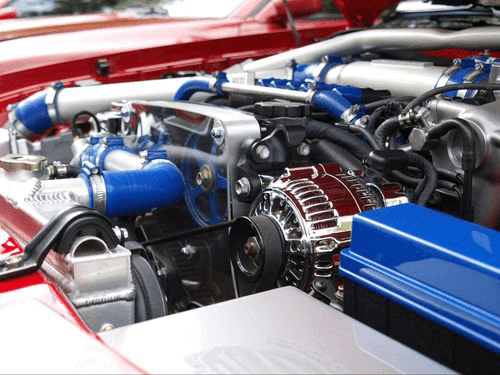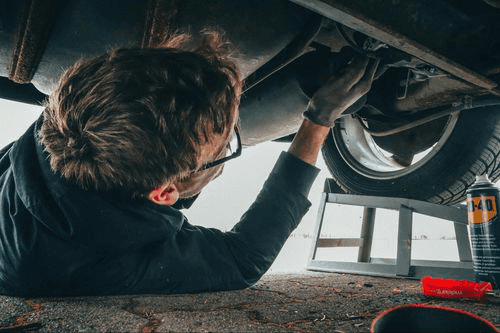Table of Contents
- How Do Car Repair Loans Work?
- Eligibility Requirements for Car Repair Loans
- What Type of Auto Repairs Can Be Covered by a Loan?
- What Are the Cons of Auto Repair Loans?
- Is It Cheaper to Repair a Car or Purchase a New One?
- What Are Alternative Options for Financing Car Repairs?
- Should I Take Out a Loan to Fix My Car?
- Benefits of Auto Repair Financing
- Finance Your Car Repairs Through Choicecash Title Loans
How Do Car Repair Loans Work?
The right auto insurance coverage can stop you from dipping into your savings if a car accident happens and your vehicle is damaged. But if your car needs some unexpected repairs because of normal wear and tear, your car insurance coverage won’t save the day. Instead, car repair loans may be able to help you get fast financing to stay on the road!
With an auto repair loan, you aren’t forced to pay the mechanic’s bill immediately. You can use your loan proceeds to pay the bill upfront and then repay the loan in installments over time, which can be significantly more affordable for many vehicle owners with smaller savings accounts. The most common types of auto repair loans can include the following:
| Car Repair Loan | Secured or Unsecured | Typical Repayment Terms |
| Personal Loans | Unsecured or Secured | 12-60 months |
| Payday Loans | Unsecured | 2 weeks to 30 days |
| Title Loans | Secured | Depends on the Borrower’s State of Residence and the Lender |
Auto repair loans can be unsecured or secured, but it is usually easier to get approved for the latter since secured loans require the borrower to provide collateral for the loan. With title loans, you can use the title of your qualifying car as collateral for the loan and tap into a portion of its equity for car repairs or other personal expenses!
Each type of loan has its own pros and cons, along with different loan terms, interest rates, and loan amounts. With so many car repair loan options, it can be overwhelming, especially if you need fast money to get your car back on the road! But, it’s important to choose a car repair financing option that fits your needs and is the most advantageous type of loan for your financial situation.
Eligibility Requirements for Car Repair Loans

The eligibility requirements will vary depending on the type of loan you choose to handle your unexpected car repairs. Keep in mind that secured loans typically have more flexible application processes, but every loan has a set of requirements that you’ll need to meet to get approved for the funds you need.
Title Loans: In the case of a title loan, you will need to have an automobile with a qualifying amount of positive equity. Your car should be in good working condition when you submit your loan request, which means it can’t be stuck in the shop! If your car is being worked on and you have another eligible vehicle as your backup, that vehicle can be your ticket to paying for the necessary repairs. With a car title loan, you will be asked to present a car title in your name, proof of income, and a few other documents for verification purposes. One of the many benefits of car title loans is that you don’t have to have a strong credit history in order to qualify for funding.
Personal Loans: Personal loans come in two forms – secured or unsecured. Therefore, eligibility criteria can vary based on whether you will be required to use a qualifying asset as collateral for the loan. Generally, when a lender is determining your eligibility for a personal loan, they will review your debt-to-income ratio, along with your credit history and your ability to make a payment on the loan. Unsecured personal loans tend to have more strict credit requirements, so you may not receive approval if you have a poor credit score.
Payday Loans: To get approved for a payday loan, you will typically need to have a steady source of income and proof of identity. Payday loans tend to be flexible with their credit requirements and offer fast funding timelines, but the trade-off is that they are known for their high interest rates and fees.
Whichever loan you are eligible for, you can use your funds to handle different kinds of car repairs and hopefully get your vehicle back on the road where it belongs!
What Type of Auto Repairs Can Be Covered by a Loan?
Several types of auto repairs that may be covered by loans can include the following:
- Tire Replacements
- Flushing Radiators and Cooling Systems
- Brake Pad, Battery, and Ignition Coil Replacements
- Suspension Adjustments
- Radiator Repairs
- Oil Changes and General Car Maintenance
- Blown Engines and Transmission Repairs
If you are applying for a car repair loan and already have an estimate from a mechanic, make sure your lender is aware of the list of repairs that are required for your car. You will want to confirm that you are able to spend your money on these types of repairs before you sign your loan agreement.
What Are the Cons of Auto Repair Loans?

The interest rates for financing car repairs could be high, depending on various factors listed below:
- The Type of Loan You Choose
- Your Financial History
- The Length of Your Loan Terms
Normally, a high credit score provides access to loans with more favorable loan terms, which include low interest rates. Although you can get financing for car repairs with poor credit, you might not qualify for a personal loan without a strong enough credit score.
Comparatively, both title loans and payday loans can accommodate bad credit borrowers. However, keep in mind that there are potential drawbacks to title loans and a few disadvantages associated with payday loans. With title loans, one of the potential cons is that your vehicle can be legally repossessed by the lender if you default on the loan.
Payday loans offer fast access to cash, but they have very short repayment periods and the average payday loan amount is around $500. If your car needs extensive repairs, funds from a payday loan may not be enough to cover what you owe the mechanic or repair shop.
If you are eligible for a ChoiceCash title loan, you can access up to $15,000 and receive your funds in as little as one business day!1 If you want to avoid the potential pitfalls of title loans, make sure to pay your loan on time and reach out to your lender if you can’t keep up with your payments.
Is It Cheaper to Repair a Car or Purchase a New One?
Before deciding between fixing your car and buying a new one, you will need to check the auto warranty on your vehicle to see if the repair can be covered. If the repairs are not covered by your car’s warranty or extended warranty, you can ask your mechanic or the repair shop if a payment plan is available so you can repay the bill in installments over time.
If the repairs aren’t covered and no payment plan is available, you may want to consider selling your vehicle. In some cases, selling your car may be less of a hassle than having it repaired. Generally speaking, it’s cheaper to repair the vehicle than it is to get a new one – unless your car was declared to be a total loss by your insurance company and was issued a salvage title.
What Are Alternative Options for Financing Car Repairs?
You can ask your mechanic or the repair shop if a payment plan is available. A payment plan can help you repay your bill in equal monthly installments over time. But if you cannot get a payment plan and you do not want to apply for a loan, the alternative options that can be considered for financing the repairs your car are borrowing money from your friends and family members or pulling money out of your savings.
Should I Take Out a Loan to Fix My Car?
It depends. On one hand, taking out a car repair loan will help you fix your vehicle and get the necessary transportation you need to live your life. If you can afford to realistically pay back the loan, then applying for auto repair financing can be a viable option to get your vehicle back on the road.
But, if you cannot afford to fit a loan payment into your current budget, borrowing money through a car repair loan can put you in a tough situation and may leave your finances a little worse for wear. You should go over your budget carefully before you submit any kind of application for a loan and determine whether you can afford to pay back the money you intend to borrow.
Benefits of Auto Repair Financing
Car repair loans come with several benefits besides access to funding! You can use car repair loans to manage unexpected expenses related to your vehicle when you are short on cash. Without a loan, you might be more inclined to neglect the necessary repairs and routine maintenance that your car needs to stay in good working condition. By choosing a car repair loan to receive fast funding, you can ensure that your vehicle gets the pampering that it needs and minimize the risk of more extensive and expensive repairs later on.
Additionally, relying on a car repair loan to get the job done means that you don’t need to use your savings. Depleting your savings account can leave you vulnerable to other financial emergencies, and having a reliable vehicle to get to work cannot be understated, especially if you do not live in a city with convenient public transportation.
Finance Your Car Repairs Through Choicecash Title Loans
Get your vehicle back on the road without draining your bank account! If a title loan sounds like the right fit, don’t wait to find out if you qualify. Complete a short questionnaire online now to see if you are instantly pre-approved! Feel free to call 855-422-7402 to speak with a loan officer today. If you are eligible for a ChoiceCash title loan serviced by LoanMart, you can receive competitive interest rates and get your money in as little as 24 hours!1





